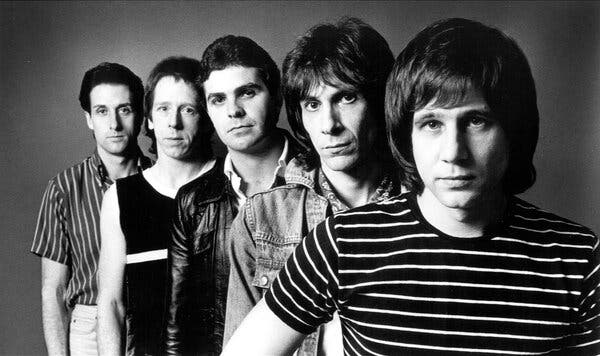Supported by
Greg Kihn, 75, Dies; Scored Hits With ‘Jeopardy’ and ‘The Breakup Song’
He carved out a place for no-nonsense power pop at the height of the MTV 1980s.

Greg Kihn, a low-key singer-songwriter who drew from Buddy Holly and the Beatles while carving out a place for no-nonsense power pop at the height of the synth-pop era of the 1980s with hits like “Jeopardy” and “The Breakup Song (They Don’t Write ’Em),” died on Tuesday in the San Francisco area. He was 75.
His death, at a health care facility, was caused by complications of Alzheimer’s disease, according to a statement posted on his website on Thursday.
Mr. Kihn was a self-conscious throwback during his 1980s heyday, managing to thrive on MTV when it had cast a giant shadow over the music landscape and seemed largely divided between fashion-conscious New Wave bands with sculptural haircuts and spandex-clad pop-metal bands.
With his regular-guy persona, club-rocker mullet and boyish looks that recalled the actor Beau Bridges, Mr. Kihn espoused the charms of unadorned rock ’n’ roll. “I’d love to have hair like A Flock of Seagulls, but I could never spend all day combing it, man,” he told Rolling Stone in 1983. “I can just be myself, and they pay me for it.”
The Greg Kihn Band broke out with “The Breakup Song” from the album “Rockihnroll.” A pulsing rocker built on a jangly guitar riff, it rose to No. 15 on the Billboard singles chart in May 1981. The next year, the band scored a minor hit with “Happy Man,” off the album “Kihntinued”; it made it to No. 62.
Mr. Kihn’s perky, highly palatable radio hits went down easily — too easily, to some critics. “Greg Kihn is a nice guy,” Karen Schlosberg once wrote in the rock magazine Trouser Press. “That’s his trouble. He’s too easygoing for impassioned rock ’n’ roll, too heavy-handed for pure pop. Imagine Tom Petty without anguish, Bruce Springsteen without New Jersey.” The longtime Village Voice critic Robert Christgau once labeled him a “Kihnformist.”
Mr. Kihn answered his critics with “Jeopardy,” which soared to No. 2 on the Billboard Hot 100 in 1983 while receiving saturation airplay on MTV.
He got an extra jolt of publicity the next year with Weird Al Yankovic’s parody song “I Lost on Jeopardy,” the video for which featured a cameo by Mr. Kihn.
Through it all, Mr. Kihn expressed no desire to alter his band’s straightforward approach. There would be no dry ice and fog machines at his live shows.
“We want people to come back to hear the music,” he said in a 1982 interview with The Ukiah Daily Journal of Northern California. “I mean, nobody goes to see Bruce Springsteen because of the light show.”
Gregory Stanley Kihn was born on July 10, 1949, in Baltimore. Like many rockers of his era, he decided he wanted to be a musician after watching the Beatles perform on “The Ed Sullivan Show.”
“I know it sounds absurd — most 5-year-old boys say they want to be firemen or policemen or baseball players, or even the president,” he told CBS News in 2014. “Not me. I wanted to be one of the Beatles.”
Mr. Kihn began playing in local folk clubs while he was in high school. He moved to San Francisco in 1974 and eventually settled in Berkeley, where he signed with the influential independent label Beserkley Records, whose roster included Jonathan Richman.
Mr. Kihn and his band stood out in a music scene long known for the free-form improvisation of bands like the Grateful Dead, as well as Santana and Journey in their early years. .
“We weren’t like the other S.F. bands,” he said in a 2018 interview with Music Recall Magazine. “Our music was derived from the British bands like the Who and the Faces.”
“It was all about the songs,” he added, “not the jamming.”
While his band became a local favorite, it failed to make a mark commercially with its first five albums. “The rap is, why hasn’t Greg Kihn made it yet,” he told Rolling Stone in 1980. “I don’t know and I don’t care. … I’ve given up worrying about ascending to the throne.”
That changed the next year with “The Breakup Song,” launching him on a career that carried through the 1990s and totaled more than 15 albums. His first one in 17 years, “Rekihndled,” was released in 2017.
Mr. Kihn became a popular disc jockey on the local classic rock station KFOX in the mid-1990s and held the job until 2012. He also published six novels, including the thrillers “Painted Black,” about the death of Brian Jones of the Rolling Stones, and “Rubber Soul,” about the Beatles.
He is survived by his wife, Jay Arafiles-Kihn; a son, Ryan Kihn; a daughter, Alexis Harrington-Kihn; a sister, Laura Otremba; and two grandchildren.
Despite his run as a rock star — which included opening for the Rolling Stones on their landmark 1981 tour — Mr. Kihn described himself as something of a rock ’n’ roll curator.
“I just wanna see what I like survive,” he told Rolling Stone in 1983. “I want kids who are growing up and getting their first guitars to learn Chuck Berry riffs. That’s important to me.”
Alex Williams is a Times reporter on the Obituaries desk. More about Alex Williams
Advertisement

